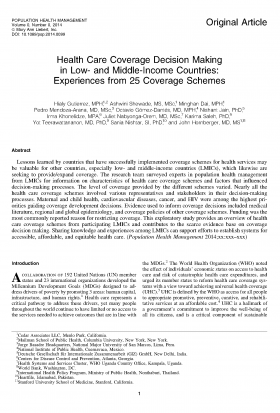This website uses cookies so that we can provide you with the best user experience possible. Cookie information is stored in your browser and performs functions such as recognising you when you return to our website and helping our team to understand which sections of the website you find most interesting and useful.
Health Care Coverage Decision Making in Low- and Middle-Income Countries: Experiences from 25 Coverage Schemes (2014)

Details
Hialy Gutierrez, MPH,1,2 Ashwini Shewade, MS, MSc,1 Minghan Dai, MPH,1 Pedro Mendoza-Arana, MD, MSc,3 Octavio Go´mez-Dante´s, MD, MPH,4 Nishant Jain, PhD,5 Irma Khonelidze, MPA,6 Juliet Nabyonga-Orem, MD, MSc,7 Karima Saleh, PhD,8 Yot Teerawattananon, MD, PhD,9 Sania Nishtar, SI, PhD,10 and John Hornberger, MD, MS1,11
Abstract
Lessons learned by countries that have successfully implemented coverage schemes for health services may be valuable for other countries, especially low- and middle-income countries (LMICs), which likewise are seeking to provide/expand coverage. The research team surveyed experts in population health management from LMICs for information on characteristics of health care coverage schemes and factors that influenced decision-making processes. The level of coverage provided by the different schemes varied. Nearly all the health care coverage schemes involved various representatives and stakeholders in their decision-making processes. Maternal and child health, cardiovascular diseases, cancer, and HIV were among the highest priorities guiding coverage development decisions. Evidence used to inform coverage decisions included medical literature, regional and global epidemiology, and coverage policies of other coverage schemes. Funding was the most commonly reported reason for restricting coverage. This exploratory study provides an overview of health care coverage schemes from participating LMICs and contributes to the scarce evidence base on coverage decision making. Sharing knowledge and experiences among LMICs can support efforts to establish systems for accessible, affordable, and equitable health care. (Population Health Management 2014;xx:xxx–xxx)
Full text can be accessed from:
http://www.ncbi.nlm.nih.gov/pubmed/25393442




